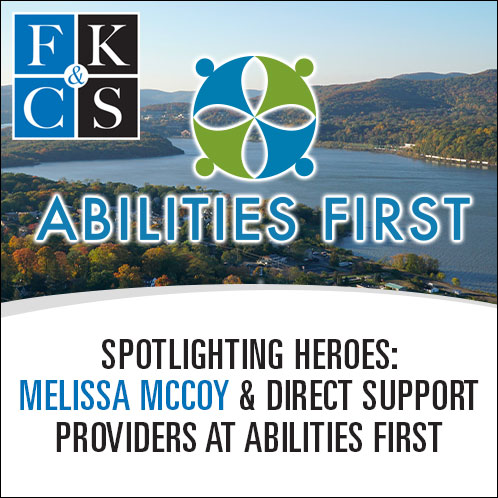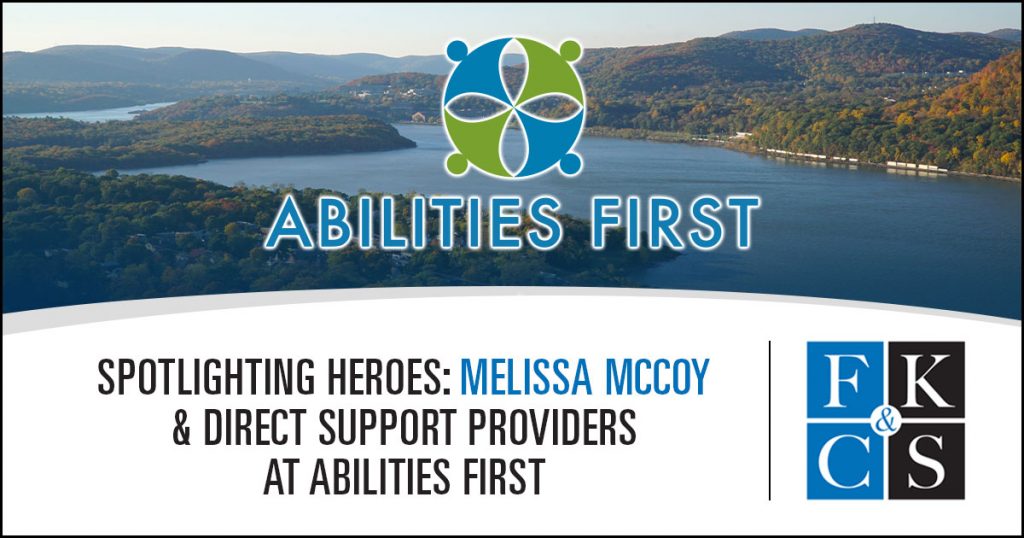
Our firm admires the hard work, dedication and fierce commitment of frontline workers who are helping those in need, especially during the COVID-19 pandemic. They have stepped up in the face of this great challenge and we, along with the rest of our community, are profoundly grateful. To shine a light on some of the heroes in our community, we have created a series of blog posts to help share their stories of working during COVID-19.
Melissa McCoy, chief advancement officer at Abilities First, works with many Direct Support Providers (DSPs) to care for clients during the pandemic. Unfailing in their commitment to helping others, even in the face of a global health crisis, Melissa and her colleagues are heroes, and we applaud them. Hear about their experiences working through this difficult time in the Q&A below.
Tell us more about the mission of your organization and the populations you serve.
Abilities First is a nonprofit organization that provides people with disabilities and their families support to attain independence, self-determination, integration and acceptance by others through education, exploration and experience. Abilities First serves more than 1,400 individuals ages birth through life throughout the Hudson Valley region in day programs, schools, employment training, community habilitation programs and residential services.
How you have been carrying your mission, programs and services forth during COVID-19? What has changed?
On a daily basis, over two weeks in March, state mandates required the closures of schools, Day Habilitation and various programs. The only programs to remain open at all times have been Community Habilitation and the residential programs which are home to 130 adults in 13 homes, as well as staff with supportive housing, where people love more independently.
The staff working in the houses have worked tirelessly to use universal precautions to protect the Abilities First residents in the home, themselves and their families when they return from shifts at work. This is a very stressful time.
The community doesn’t often remember that agencies like Abilities First have Direct Support Providers (DSPs) who continue their work 24/7, caring for people face-to-face in the group homes, at community worksites – where many individuals are essential employees – and supporting through Community Habilitation. Direct Support providers of all kinds have faced demanding changes, and Day Habilitation staff have faced the largest change. Some are supporting directly, while others are now providing care via Skype and Zoom.
Program individuals with disabilities, who used to attend the day programs, no longer leave the house daily (M-F) to see their friends and enjoy community activities at Day Habilitation’s Community Based sites. They are now in their homes 24/7, with a no visitation policy. The Day Habilitation staff that support them were initially furloughed while the state determined how services could continue. This was difficult for people who enjoy their work and for those they care for. Once new regulations were in place with The New York State Office for People With Developmental Disabilities (OPWDD), the staff soon returned to work and began supporting individuals in their place of residence, rather than at a community site. Both challenging and positive, it is a new way for staff to care for the individuals in a different setting – more one-to-one. This change is greatest for the Day Habilitation staff. One staff member, who lives approximately ten minutes from her typical work location, now drives about 30 minutes to a house in Rhinebeck. Also, some Day Habilitation Direct Support Staff are working with individuals they are unfamiliar with and collaborating with an entirely new team.
House managers have deadlines, life plan meetings, money to manage and other managerial tasks that have been challenged. They find it perplexing to maintain routine, due to extra people being in the house, the women being home, concern for the health and well-being of everyone in the house, mentally preparing for future possibilities and focusing on current conditions and everyone’s needs.
How has your specific role changed since the start of this crisis?
As a manger, my role has taken a slight turn. I am more involved with individuals’ care. I have much more one-on-one time with the individuals. I have always been a listening ear for my team, but recently, it has become more essential. There are reasonable, increased concerns and suggestions, and I gently offer emotional support. We are in this together.
Direct Support Providers (DSPs) are on call all the time now with individuals at home. It is much harder to keep them occupied and content when they can’t leave the house or see their families.
Services for individuals are less social and often via tele-service, rather than in a community setting.
For residential sites where there may be concern for safety, individuals can find themselves having to isolate in a room for 14 days, and staff have received training and are wearing personal protective equipment (PPE) that they never had before.
Maintaining protection coming into and out of all programs, offices and residences is very difficult, as our staff changes by shift seven days a week.
What are the biggest challenges your organization is facing right now?
A big challenge is explaining what is happening in the world to the individuals we support. Conversations have included defining a pandemic and explaining why they are staying home. And the hardest is telling them someone may have died due to complications of COVID-19. All of this is especially difficult to explain to someone who has increased forgetfulness and other challenges, amongst a disrupted schedule.
Fear of the unknown has increased. Was I near someone with COVID-19 and didn’t know it? Am I asymptomatic? What happens if I accidently bring the virus to work? The strain of these questions is mentally draining, stress inducing and very heavy on the shoulders of everyone on our staff, as well as those in the residences.
How can people show support?
Abilities First is a nonprofit and thus restricted to revenue from billed services, with little available funds for non-essentials. COVID-19 has added a significant amount of staffing needs, expense for PPE, technological demand to supply services remotely to students and adults, as well as the significant increase in supplies to care for folks living in Abilities First-supported residential settings, 24/7. Donated items and financial support is needed, and to donate, you can visit www.abilitiesfirstny.org/donate.
What has resonated with you most during this time?
Staff Responses:
- A recognition for how much we have taken for granted. The inspiration to do things that have been put off “until tomorrow.”
- That universal precautions are much more crucial than we had believed.
- We now know that we are all essential. We are essential to the individuals and to each other. We have also learned that we are a rock-solid team, even if we are divided between programs. A united working unit that impacts the lives of the people we love and support.
Admin Responses:
- While leadership is critical at a time like this, the “essential” element of this organization’s mission is its service to those we support and the workers (DSPs) who provide that. Without their compassionate care, we are not able to carry out the mission that was promised to this community – to care for those with disabilities.
- What lies ahead is the same mission, with a new look and demands. Our challenges are increased due to the cost of safely providing services, but we will ebb and flow as we have for the past 58 years!
If you had to pick something positive that has come out of this, what would it be?
- With hope and support we will overcome this and bring its lessons along with us. Our story will be one of perseverance and courage.
- Knowing that through the most difficult times we can come together and make a positive impact on each other and the people we serve. When it seems everything is falling apart, we are the glue keeping it together.
- Building new relationships with other members of the individuals’ support circles is enlightening. Seeing how each department touches the lives of the individuals builds on how we support them.
To connect with Melissa and Abilities First, you can visit www.abilitiesfirstny.org or follow them on Facebook, LinkedIn or Twitter.

